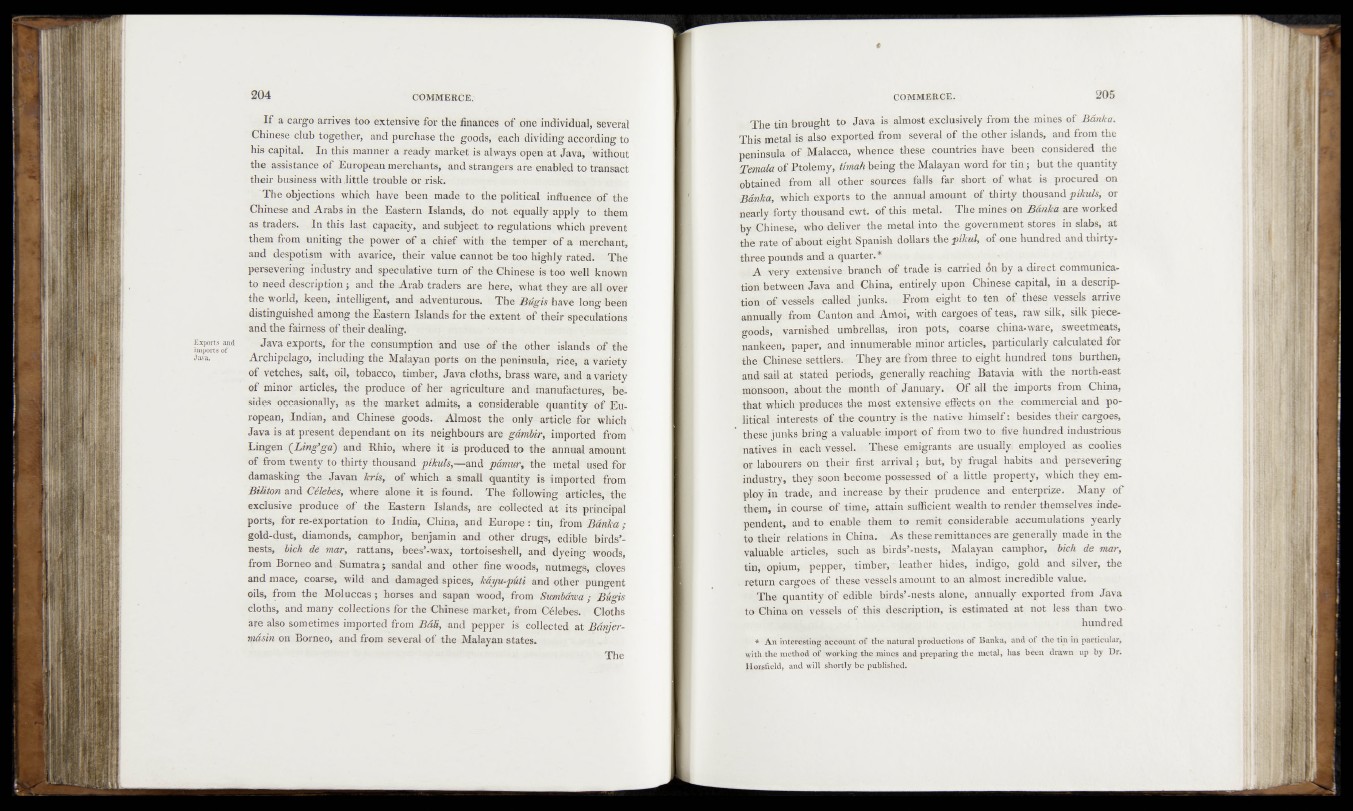
Exports and
imports of
Jam.
If a cargo arrives too extensive for the finances of one individual, several
Chinese club together, and purchase the goods, each dividing according to
his capital. In this manner a ready market' is always open at Java, ’without
the assistance of European merchants, and strangers are enabled to transact
their business with .little trouble or risk.
'The objections which have been made to the political influence Of the
Chinese and Arabs in the Eastern Islands, do not equally apply to them
as traders. In this last capacity, and subject to regulations which prevent
them from uniting the power of a chief with the temper of a merchant,
and despotism with avarie* their value cannot be too highly rated. The
persevering'Industry and speculative turn of the Chinese is too well known
to need description ; and the Arab traders are here, what they are-all over
the world, keen, intelligent, mid adventurous. The ïtàgis have long been
distinguished among the Eastern Islands for the extent of their speculations
and the fairness of their dealing.
Java exports, for the consumption-and use of the other islands of the
Archipelago, including the Malayan ports on the peninsula, rice, a variety
of vetches, salt, oil,, tobacco, timber, Java cloths, brass ware, and a variety
o f minor articles, the produce of her agriculture and manufactures, besides
occasionally, as the market admits, a considerable quantity of Eu-
ropean, Indian, and Chinese goods. Almost the only article for which
Java is at present dependant on its neighbours are gambit-, imported from
Lingen (Ling*go) and Rhio, where it is produced to the annual amount
of from twenty to thirty thousand piktds,—and pâmw, the métal used for
damaskibg the Javan kris, o f which a small quantity is imported from
BiUton and Celebes, where alone it is found. The following- articles, the
exclusive produce xtf the Eastern Islands, are 'Collected at • its principal
ports, for re-exportation to India, China, and Europe : tin, from Bânka ;
gold-dust, diamonds, camphor, benjamin and other drugs, edible bifds5-
Bests, bich de mar, rattans, bees5-wax, tortoiseshell, and dyeing woods,
from Borneo and Sumatra ; sandal and other fine woods, nutmegs, cloves
and mace, coarse, wild and damaged spices, kàyu-pkti and other pungent
oils, from the Moluccas; horses and sapan wood, from Stmbâwa ; B igis
cloths, and many collections for the Chinese market, from Célebes. Cloths
are also sometimes imported from B&U, and pepper is collected at Bâvger-
nttâsin on Borneo, and from several of the Malayan states.
The
I%e tin brought to Java is almost exclusively from the mines of Banka.
This metal is «Has experted from several of the other islands, and from the
peninsula of Malacca, whence these countries have been considered the
Temala of Ptolemy, timah being the Malayan word for tin ; but the quantity
obtained from all other sources falls far short of what is procured on
Banka, which exports to the annual amount of thirty thousand pikuls, or
nearly forty thousand cWt. of this metal. The mines on Banka are worked
by'(Chinese, who. deliver the metal into the government stores in slabs, at
the rate of about .eight Spanish dollars the pikul, of one hundred and thirty*
three pounds and a quarter.*
:A very extensive branch of trade is carried dn by a direct communication
between Java and China, entirely upon Chinese capital, in a description
of vessels called junks. From eight to ten of these .vessels arrive
annually from Canton and Amoi, with cargoes of teas, raw silk, silk piece-
goods, varnished umbrellas, iron pots, coarse china.ware, sweetmeats,
nankeeil, paper, and innumerable minor articles, particularly calculated for
the-Chinese settlers.y They are from three to eight hundred tons burthen,
and sail at stated periods, generally reaching Batavia with the north-east
monsoon, about the month of January. Of all the imports from China,
that which produces the most extensive effects on the commercial and political
interests-of tlie country is the native himself: besides their cargoes,
these junks bring a valuable import o f from two to five hundred industrious
m tives in each vessel. These emigrants are usually, employed as coolies
or labourers on their, first arrival; hut, by frugal habits and persevering
industry, they Soon become possessed of a little property, which they employ
an trade, and increase by their prudence and enterprise. Many of
them, in oourse of time, attain sufficient wealth to render themselves independent,
and to enable them to remit considerable accumulations yearly
to their relations in China. As these remittances are generally made in the
valuable articles, such as birds’-nests, Malayan camphor, bich de mar,
tin, opium, pepper, timber, - leather hides, indigo, gold and silver, the
. return cargoes of these vessels amount to an almost incredible value.
The quantity of edible birds5-nests alone, annually exported from Java
to China on vessels of this description, is estimated at not less than two
hundred
' * An interesting account of the natural productions of Banka, and o f the tin in particular,
with.the method of working the mines and preparing the metal, has been drawn up by Dr.
liorsfield, and will shortly be published.